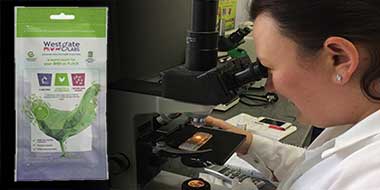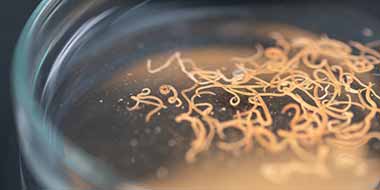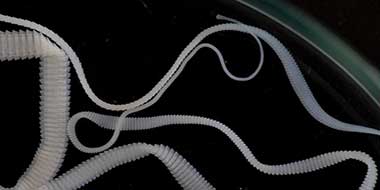Blackhead is an ancient poultry disease caused by a tiny single-celled parasite called Histomonas meleagridis. It is usually carried by the harmless caecal worm ‘Heterakis gallinarum’, which chickens sometimes have. Occasionally it can be transmitted directly between birds. Turkeys are particularly susceptible to Blackhead, and it usually caught if they have access to the same pasture as chickens.
Once a bird is infected with blackhead, the parasite (whether the caecal worm carried it or not) burrows into the wall of the caecum (the blind gut). This burrowing causes ulcers to form in the blind gut and can initially cause bright yellow diarrhoea. The blackhead next burrows through the blind gut and crosses the abdomen into the bird’s liver. This causes severe liver damage and can lead affected birds to:
- Become dull
- Die suddenly
- Rarely develop a purple/blackhead (hence the name)
Caecal worms and Blackhead
The parasite will also rapidly infect any caecal worms in the blind gut causing the caecal worm eggs to be infected with blackhead. This means infected birds will shed the blackhead organism both in their droppings and through any worm eggs in their droppings. Please remember that worm eggs can survive for years and as such once a coop or range is contaminated with infected caecal worm eggs then any poultry given access to that range and coop are vulnerable to infection.
Turkeys can also take in material (usually the droppings of other fowl) into their vents directly called ‘cloacal drinking’. This means blackhead can spread very fast throughout a turkey flock.
Unfortunately, the most effective medication for blackheads called dimetronidazole has been banned by the EU. Some antibiotics can help affected birds and if you are concerned about blackhead in your turkeys you should talk to your vet. Oregano has been anecdotally thought to help control blackhead when given in feed or water. Because infected caecal worm eggs are very difficult to destroy, infected turkey flocks should be immediately wormed with Flubenvet in feed for seven consecutive days.
After a range area has had an infected flock of turkeys (or other poultry for that matter), ideally poultry should never be kept on the range due to the high chance of infection. Some keepers lime the range to destroy the worm eggs though it is unlikely that enough worm eggs will be destroyed to prevent new birds from becoming infected. The coop itself can be disinfected with a suitable disinfectant after being washed (with a detergent) and dried. When selecting a disinfectant it is best to choose an anticoccidial disinfectant such as Interkokask to destroy the worm eggs.
Do not keep chickens and turkeys together
- Regularly check for worms (every three months) and if your turkeys need worming, give them Flubenvet in their feed. This will help to keep caecal worms out (and hopefully blackhead too).
- Regularly add oregano to their food or drinking water (Orego+).
Do you have a photo of a Turkey suffering from Blackhead we can use in this article? Please contact me if you do 🙂



